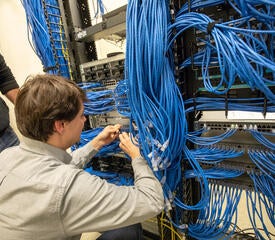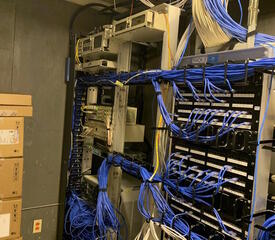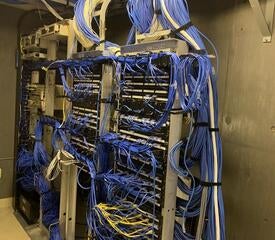We want to hear from you! Take the survey.
How do you use It’s Your Yale? How can it be improved? Answer for a chance to win Yale swag.
NGN project update
March 18, 2021
With the successful completion of five pilot buildings last December, the NGN team is now actively working to transition buildings throughout the Medical Campus. Following the Medical Campus, the team will move to West Campus and then northward from the Medical Campus. We expect the full NGN campus rollout to take 4+ years.
Of the work underway in the Medical Campus area, Julie McEvoy, Director of Program Management for the School of Medicine, states, “The team has made concerted efforts to learn from each building migration and continuously improve processes in all areas, from communications to discovery and cutover. They are consummate professionals building a foundation of trust, transparency, and reliability with our constituents. I’m excited to be a part of this work.”
The NGN program will bring more resilient, secure, robust, and efficient network services to Yale’s community members and serve the community’s complex, medical, research, and institutional learning needs.
Each building deployment is a step forward for Yale’s network services, the Yale community, and, by extension, the realization of the University’s mission. There continues to be excitement among leadership and partners to adopt the new network, which replaces Yale’s aging infrastructure. It brings new capabilities, including automation and security tools that will allow IT to be more strategic in its delivery and oversight of network services.
NGN Production Buildings as of March 12, 2021
- 25 Science Park – Pilot Building, Science Park Campus
- 205 Whitney Avenue – Pilot Building, Science Hill Campus
- 221 Whitney Avenue – Pilot Building, Science Hill Campus
- 1120 Chapel Street – Pilot Building, Old Campus
Medical Campus Buildings
- 100 Church Street South – Pilot Building
- 270 Congress Avenue
- 230 South Frontage Road
- Amistad Garage
- 1 Long Wharf Drive
Transitioning these buildings included approximately 1,970 users, 37 telecommunications closets, 52 network switches, and 88 wireless access points.
The total end-to-end deployment of each building, beginning with advanced preparation and ending with the removal of legacy equipment, requires significant team coordination and work effort. Telecom closets are surveyed and remediated to prepare for the new network. Next, we identify and, if needed, upgrade building fiber connections to the core network. We survey building leaders and unit administrators to share information about specialty areas and network use-cases in their buildings, e.g., call centers, research labs, auditoriums.
How can building stakeholders prepare for NGN?
- Identify your systems and data for risk classification and appropriate compliance with Yale’s Minimum Security Standards
- Identify systems that are using public or static IP addresses and, wherever possible, move them to DHCP w/ private IP addressing.
- If third-party vendors are involved in supporting your equipment, additional time may be necessary to confirm system updates and coordinate implementation.
- Review and, as required, take action on notifications about NGN activity in your area.
Will NGN change how we use the network?
With appropriate advanced preparations, day-to-day network use in offices, labs, classrooms will be essentially unchanged. However, behind the scenes, network service improvements will support:
- Greater resiliency and fewer outages
- More capacity (e.g., faster intra-Yale data transfers)
- Automated provisioning for faster network moves/adds/changes
- Increased network visibility and reporting for faster network and security incident response and repair
- Ability to meet rising security requirements in data use agreements
The project spans through fiscal year 25, focusing first on the 66 buildings remaining at the Medical Campus in late fiscal year 22 and 22 buildings at West Campus in fiscal year 23. We will announce updates to the timeline on the Next Generation Network project website.
In addition to the physical transitioning of buildings onto Next Generation Network, the team also builds and deploys advanced network security features. These features are designed to better secure and protect Yale’s community, network-connected assets, and activities.
The work underway is just the beginning. The NGN team looks forward to ramping-up their transition activities and network security features development to fully deliver a modern and flexible network service that will serve Yale for years to come.






